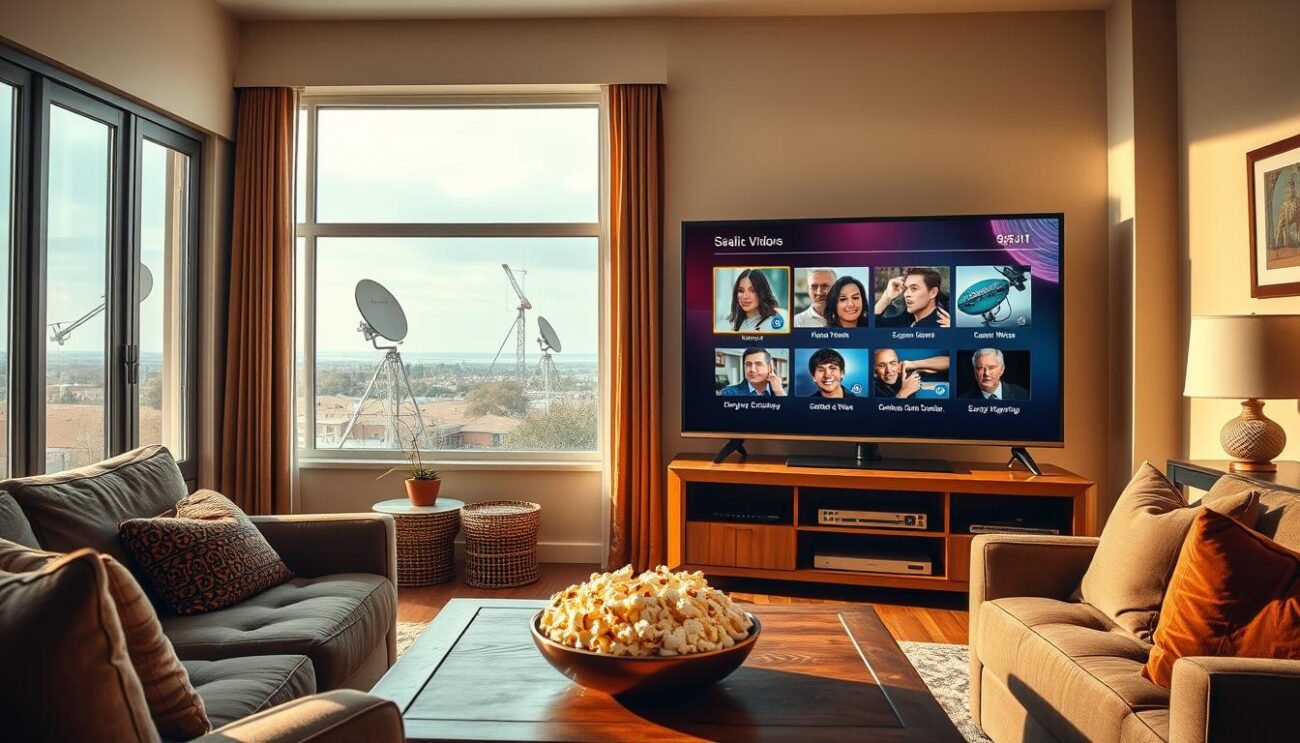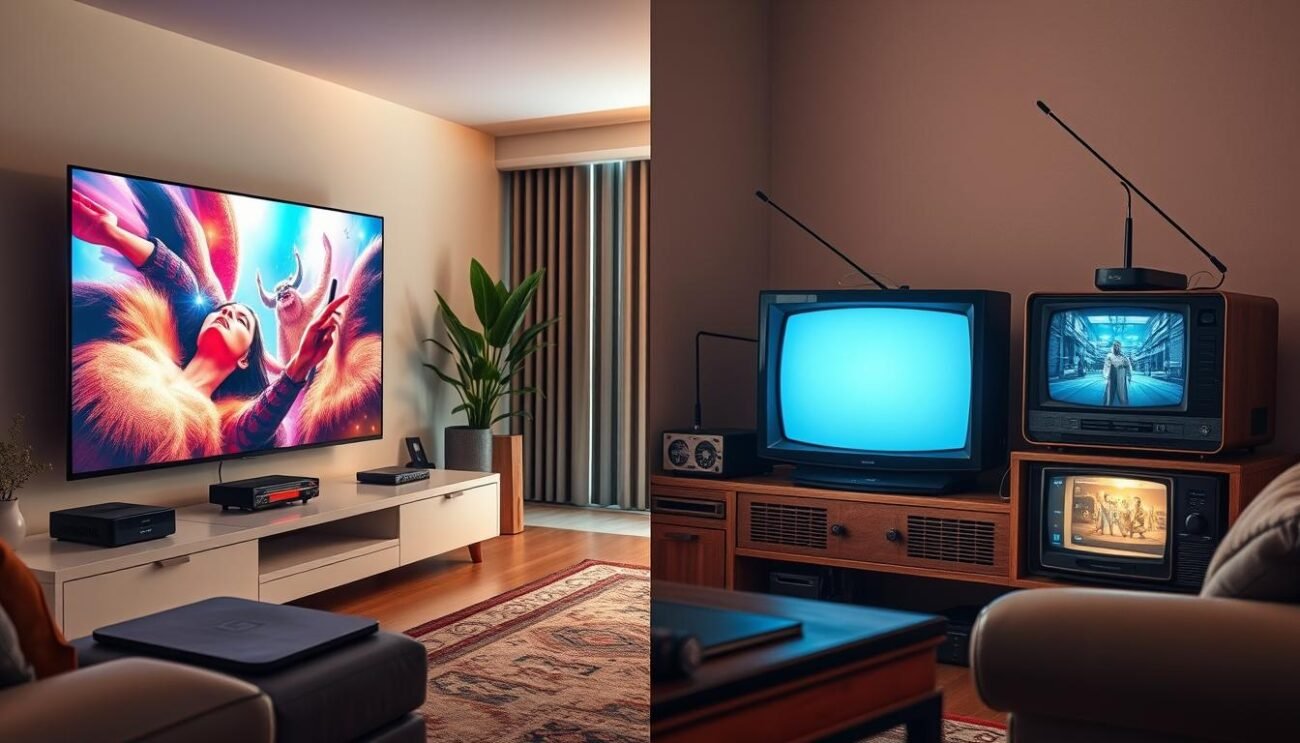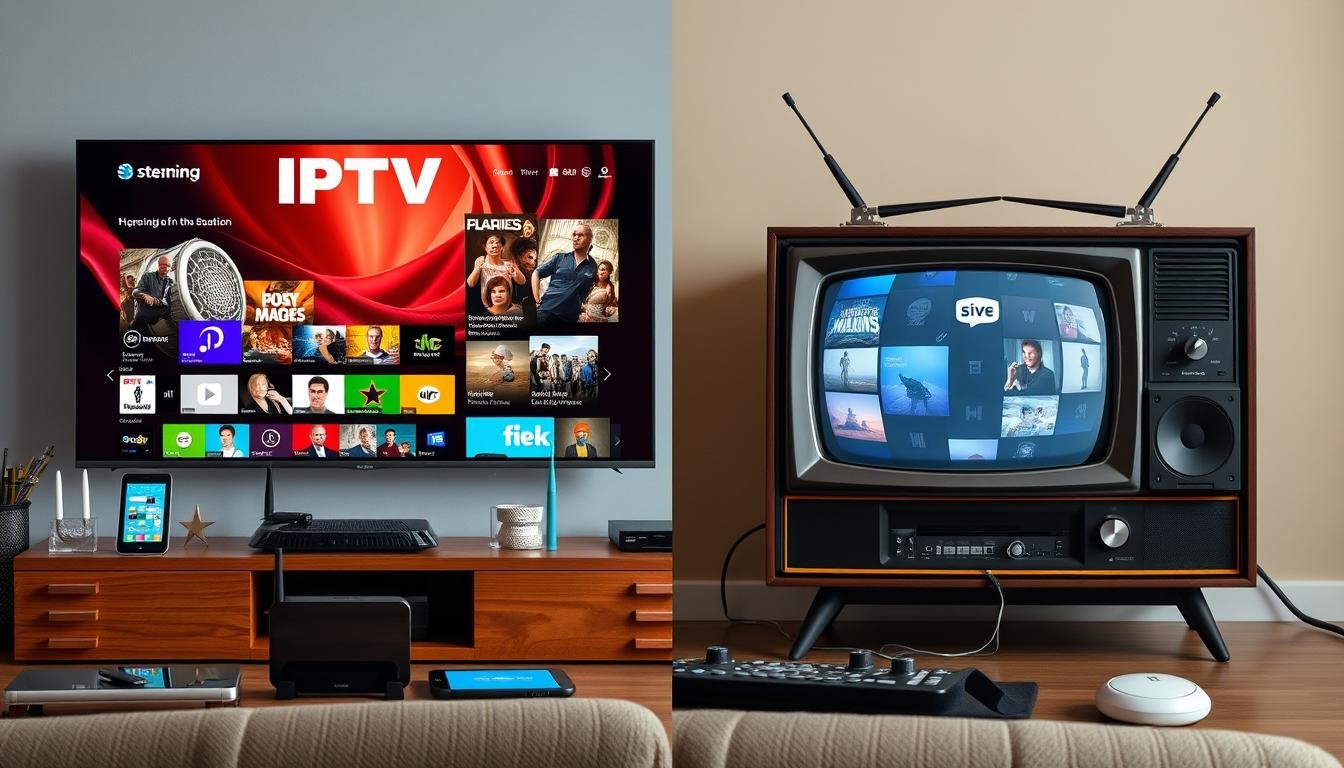In today’s fast-changing digital world, the fight between IPTV and traditional TV is getting fiercer. Technology is making these two options more similar, leaving viewers wondering which one fits their needs best. But the big question is: Which one is truly better for you?
Key Takeaways
- IPTV and traditional TV offer distinct features and experiences
- Streaming services are the backbone of IPTV, providing on-demand and live TV options
- Cable and satellite TV still have their advantages, but the rise of cord-cutting is undeniable
- Cost comparison is a crucial factor in choosing between IPTV and traditional TV
- The decision ultimately depends on your viewing habits, budget, and lifestyle preferences
We’ll look into IPTV and traditional TV, comparing their main differences. We’ll talk about streaming services, the good and bad of cable and satellite TV, and the cord-cutting trend. By the end, you’ll know which technology suits your needs best. This will help you make a choice that improves your viewing experience.
Defining IPTV and Traditional TV
In the world of TV, two main types have come to the forefront: IPTV and traditional TV. Knowing what makes each unique helps you pick the best one for you.
What is IPTV?
IPTV uses the internet to send TV shows, not traditional cables or satellites. It lets you watch lots of channels, shows on demand, and interactive stuff on devices like smart TVs and phones.
IPTV gives you a more personal way to watch TV. You can watch live sports, news, movies, and TV shows through your internet.
Understanding Traditional Cable and Satellite TV
Traditional TV means cable and satellite TV, the old ways of getting TV. These use cables or dishes to send TV signals to your home.
Cable TV has many channels in packages. Satellite TV reaches more places and has even more channels. Both have their pros and cons to think about when picking your TV service.
| Feature | IPTV | Traditional TV |
|---|---|---|
| Delivery Method | Internet-based | Cable or Satellite |
| Content Availability | Vast and on-demand | Curated channel packages |
| Viewing Experience | Personalized and interactive | Linear and scheduled |
| Accessibility | Requires internet connection | Requires cable or satellite installation |
Knowing the key differences between IPTV and traditional TV helps you choose the right one. It depends on what you like to watch, how you like to watch it, and what you need from your entertainment.
IPTV vs Traditional TV: Key Differences
When it comes to television, IPTV and traditional TV have big differences. Knowing these differences helps you pick the best option for your viewing habits.
IPTV uses the internet to send shows, giving you more control over what you watch. On the other hand, traditional TV uses cable or satellite, offering shows at set times.
| Feature | IPTV | Traditional TV |
|---|---|---|
| Content Delivery | Internet-based | Cable/Satellite networks |
| Viewing Experience | Flexible, on-demand | Linear, scheduled |
| Device Compatibility | Wide range of devices, including smart TVs, smartphones, and tablets | Limited to traditional TV sets and set-top boxes |
| Customization | Highly customizable, with personalized recommendations and content selection | Limited customization options, with pre-determined channel lineups |
IPTV works on many devices like smart TVs, phones, and tablets. This makes watching shows more flexible. Traditional TV mainly works on regular TVs and set-top boxes.
IPTV lets you pick your shows and get recommendations that fit your taste. Traditional TV has a set list of channels you can’t change.
Knowing the key differences between IPTV and traditional TV helps you choose the right one for you.
Streaming Services: The Backbone of IPTV
IPTV uses streaming services to send content over the internet. These platforms are key to IPTV, giving users lots of on-demand content. They let users watch their favorite shows, movies, and live events on many devices.
Popular Streaming Platforms
Netflix, Hulu, Amazon Prime Video, and Disney+ are top streaming services for IPTV. They have a wide range of content. This includes the newest movies, hit TV series, documentaries, and more.
Advantages of Streaming Services
Streaming services have changed IPTV a lot. They offer on-demand content and personalized recommendations. Users can watch content on many devices, changing how we watch media.
OTT media and VOD have made IPTV even better. They give users more control over what they watch.
IPTV is getting better, and streaming services are key to delivering content. By using these platforms, IPTV providers can give customers a smooth, personalized, and on-demand experience. This makes IPTV stand out from traditional TV services.
Cable and Satellite TV: The Traditional Approach
Traditional cable and satellite TV are still big in the TV world, even with IPTV and streaming on the rise. Let’s look at the good and bad of these old-school TV options. We’ll see how they stack up against IPTV.
Pros and Cons of Cable TV
Cable TV has been a mainstay in American homes for years. It brings a wide range of TV channels to viewers. The perks of cable TV are:
- Extensive channel selection, catering to diverse viewing preferences
- Consistent and stable signal quality, with minimal interruptions
- Bundled packages that can include internet and phone services
But, cable TV isn’t perfect. Some downsides include:
- Typically higher monthly costs compared to IPTV or streaming services
- Limited flexibility in channel selection and customization
- Potential hidden fees and contractual obligations
Satellite TV: An Alternative to Cable
Satellite TV is another way to get TV without using cable. It uses satellite signals to deliver content. The benefits of satellite TV are:
- Wider geographical coverage, reaching areas not served by cable
- Potentially lower monthly costs in certain regions
- Increased channel selection and customization options
But, satellite TV has its own cons, like:
- Potential signal interruptions due to weather conditions or obstructions
- Typically longer installation and setup process compared to cable
- Limited bundling options with other services like internet and phone
Choosing between cable TV, satellite TV, and IPTV depends on what you want and need. Think about your budget and what’s available in your area. Knowing the pros and cons of each can help you pick the best TV option for you.

Cost Comparison: IPTV vs Traditional TV
Choosing between IPTV and traditional TV means looking at the costs. Let’s explore the prices of these two options. This will help you decide based on your budget and what you need financially.
IPTV services usually have flexible and affordable prices. You can pick from different bundles or single channels. This lets you match your subscription to what you watch and how much you can spend. IPTV also offers deals and discounts, making it cheaper.
| Feature | IPTV | Traditional TV |
|---|---|---|
| Subscription Fees | Generally lower, with more customizable packages | Typically higher, with less flexibility in package selection |
| Equipment Costs | May require a streaming device, but often provided at a low or no cost | Require a cable box or satellite dish, which can be more expensive |
| Additional Charges | May include fees for premium channels or on-demand content | Often have additional fees for services like DVR, premium channels, and equipment rentals |
Traditional TV, on the other hand, has set prices with less flexibility. You’ll pay more for your subscription and have fewer channel choices. They also charge extra for things like cable boxes and DVRs, adding to the cost.
The choice between iptv vs traditional tv depends on what you watch, your budget, and your needs. By looking at the costs and what each offers, you can pick the best option for your wallet.
IPTV vs traditional TV: Which is Better for You?
Choosing between IPTV and traditional TV depends on what you like and need. Both have their own benefits. The choice between iptv vs traditional tv is based on your viewing habits and lifestyle.
Let’s look at some important factors to think about:
- Content Availability: IPTV has more channels and on-demand content for different interests. Traditional TV offers a set list of channels you might know well.
- Flexibility and Convenience: IPTV lets you watch shows on various devices, anytime, anywhere. Traditional TV is great for live events and might be easier to use.
- Cost Considerations: IPTV is usually cheaper each month. Traditional TV can cost more, especially if you add other services.
Choosing between iptv vs traditional tv is up to you. If you want flexibility, more shows, and to save money, IPTV might be best. But if you like a classic TV experience and live shows, traditional TV is a good choice.
“The future of television is not in the past, but in the internet-connected, on-demand world of IPTV.”
Think about these points to make a choice that fits your viewing habits and lifestyle. This way, you’ll enjoy your TV time more.

Cord-Cutting: The Rise of IPTV
In recent years, the TV industry has seen big changes. More people are leaving traditional cable and satellite TV for IPTV and streaming services. This move, called “cord-cutting,” is because people want more flexibility, to save money, and enjoy more on-demand content.
Reasons for Cutting the Cord
Several factors have led to more people cutting the cord:
- Cost Savings: Cable and satellite TV can be pricey, with bundles and fees that go beyond what people want to pay. IPTV and streaming services offer cheaper and more flexible options. Viewers can pay for only the content they like.
- Convenience and Flexibility: IPTV and streaming let viewers watch their favorite shows and movies whenever they want. This is unlike traditional TV, which has strict schedules.
- Personalization: IPTV and streaming services use algorithms to suggest new content that fits viewers’ tastes. This makes watching TV more engaging and personal.
- Improved Content Quality: IPTV and streaming services have created high-quality original content. This has made more people switch to digital TV.
The trend of cord-cutting is growing, making IPTV a key part of today’s TV industry. It’s changing how people watch and enjoy TV.
Over-the-Top Media and Video on Demand
The digital world has changed a lot with over-the-top (OTT) media and video-on-demand (VOD). IPTV and streaming services have changed how we watch entertainment. They give us more control and let us pick what we want to watch.
OTT media sends content straight to viewers over the internet. It has changed the old TV industry a lot. Now, people have many choices of shows and movies to watch.
Video-on-demand has changed how we watch shows and movies. We don’t have to watch shows at a certain time anymore. We can watch what we want, when we want, and even pause it.
This flexibility has made IPTV and streaming services very popular. It gives viewers more power over what they watch.
The rise of OTT media and VOD has changed the TV industry a lot. TV companies and cable providers now offer their own streaming services. They do this to stay competitive in the changing entertainment world.

The way we watch content is still changing. The lines between IPTV, traditional TV, and streaming are getting less clear. The future of entertainment will likely blend these technologies together. This will meet the changing needs and wants of today’s viewers.
Live TV: IPTV vs Traditional TV
In today’s world, on-demand content is big, but live TV is still key for many. IPTV and traditional TV both have their pros and cons for live TV.
IPTV’s Live TV Capabilities
IPTV uses the internet to bring live TV straight to your screen. It makes watching TV smooth and interactive, with pause, rewind, and quick access to lots of shows. IPTV has a big selection of channels for all kinds of viewers.
Traditional TV’s Live TV Offerings
Traditional TV, through cable or satellite, has always been the top choice for live TV. It gives a dependable viewing experience with lots of live channels and good signal quality. This is often better than IPTV in areas with poor internet.
But, traditional TV might not have as many channels as IPTV. And it can’t match IPTV’s on-demand and interactive features.
Comparing the Live TV Experience
- Channel selection: IPTV usually has more live channels, while traditional TV focuses on a few.
- Flexibility: IPTV lets you pause, rewind, and control your viewing, giving you more power over your TV.
- Signal quality: Traditional TV often has a more stable signal, especially where internet isn’t reliable.
Choosing between IPTV and traditional TV for live TV depends on what you like, your budget, and your area’s setup.
Conclusion
The debate between IPTV and traditional TV has many sides to look at. Both have their own benefits, fitting different tastes and needs. IPTV is great for those who want more control over what they watch, with its streaming and on-demand features.
On the other hand, traditional TV still offers a cozy way to watch, with lots of live channels and local shows. It’s what many are used to.
Choosing between IPTV and traditional TV depends on what you need. If you like the ease of streaming and a big selection of shows, IPTV might be right for you. But if you want a wide range of channels and a classic TV experience, traditional TV could be your best bet.
Either way, TV is always changing, with IPTV and traditional TV getting better to meet viewer needs. By looking at the good and bad of each, you can pick what suits your watching style, budget, and fun needs.
FAQ
What is IPTV?
IPTV (Internet Protocol Television) is a way to watch TV over the internet. It lets users enjoy live, on-demand, and streaming video content.
How does IPTV differ from traditional cable and satellite TV?
IPTV and traditional TV differ in how they deliver content and the user experience. IPTV is more flexible and can be used on various devices.
What are the advantages of streaming services for IPTV?
Streaming services like Netflix, Hulu, and Amazon Prime Video are key for IPTV. They offer on-demand content and let you watch on different devices.
What are the pros and cons of cable TV?
Cable TV has many channels and reliable service, often with package deals. But, it can be pricey and less flexible than IPTV and streaming.
How does the cost of IPTV compare to traditional TV?
IPTV and traditional TV costs vary based on subscription fees, equipment, and extra charges. IPTV can be cheaper and more flexible, especially for cord-cutters.
What are the reasons for the rise of cord-cutting and the preference for IPTV?
People are choosing IPTV for its flexibility and cost savings. IPTV and streaming offer a wide range of on-demand content.
How does IPTV compare to traditional TV in terms of live TV capabilities?
Both IPTV and traditional TV offer live TV. However, the selection and user experience can differ. Live TV is still important for many viewers.


